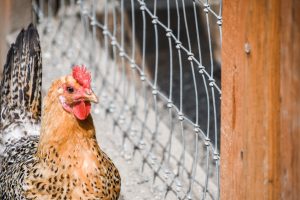Nonprofit saves 1,000 chickens from being euthanized.
The pandemic has had a profound effect on farmers and others in the livestock supply chain. They have been forced to kill off chickens and pigs as COVID-19 has closed slaughterhouses and limited demand. Farm owners often breed 1,000s of these animals for consumption, and are left unable to care for them without sales being made.
That’s why Animal Place, a nonprofit for unwanted farm animals, decided to go on a rescue mission this month, saving 1,000 chickens from an unidentified Iowa farm that had been euthanizing its stock of roughly 140,000 to manage breeding costs. The chickens were taken abroad two chartered cargo planes and flow to California, where the initiative is located.
“With funds running low, the farm had not been feeding the hens well for a week prior to rescue,” according to the sanctuary’s press release. “The farm employs a battery cage system with cages stacked four to five high, and 10 hens per cage.” It reads further, “When Animal Place heard about an Iowa egg farm gassing most of its 140,000 hens, we felt compelled to help. The farmer was willing to release 1,000 birds to us. But how would we get them to California?”

That’s when a donor stepped in. Executive Director Kim Sturla explained, “Animal Place received a donation to extend its reach to the Midwest at a cost of tens of thousands of dollars.” So, rather than taking one of its trucks to pick up the animals, rescuers were able to use the planes.
“It is a bright spot,” she said. “There’s so many struggling – human and non-human.”
Iowa is the top egg-producing state in the U.S. and the egg market has been devastated by the crisis. “About 22% of eggs go to restaurants, hotels or other food-service outlets,” said Ken Klippen, president of the National Association of Egg Farmers. With the lockdown, much of the market has tanked. “When you lose 22% of your market, it’s painful,” Klippen said. “That’s what we’re going through right now.”
“The entire process, from the 27-hour drive, arriving at the farm at 3 a.m., loading and unloading full crates from the planes and vehicles, and going straight to caring for them once we arrived at the sanctuary was the most exhausting experience I’ve ever had,” Hannah Beins, Animal Place animal care director, said, adding, “I would do it again in a heartbeat, because until their rescue these hens never got to touch grass or feel the sunshine, and now they can live out the rest of their lives as chickens should.”
The rescue group indicated they discovered deceased hens inside a barn and in cages with those still living. Volunteers will make the chickens available for adoption after checking their health. Any too ill to be adopted will remain at the sanctuary and receive lifelong care.
Founded in the late 1980s, Animal Place is one of the oldest and largest sanctuaries for farmed animals in the United States, sitting on 600-acres in Grass Valley, California. In addition to permanent sanctuary, it has a Rescue and Adoption Center in Petaluma focused on placing animals into permanent homes.


Join the conversation!